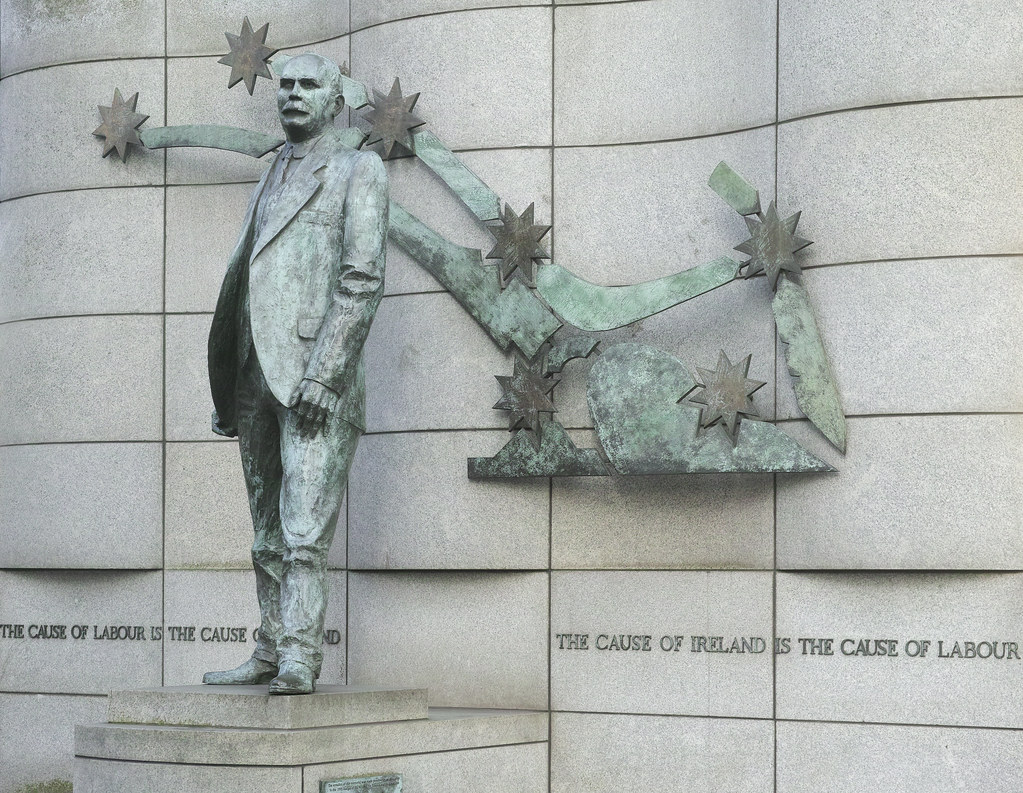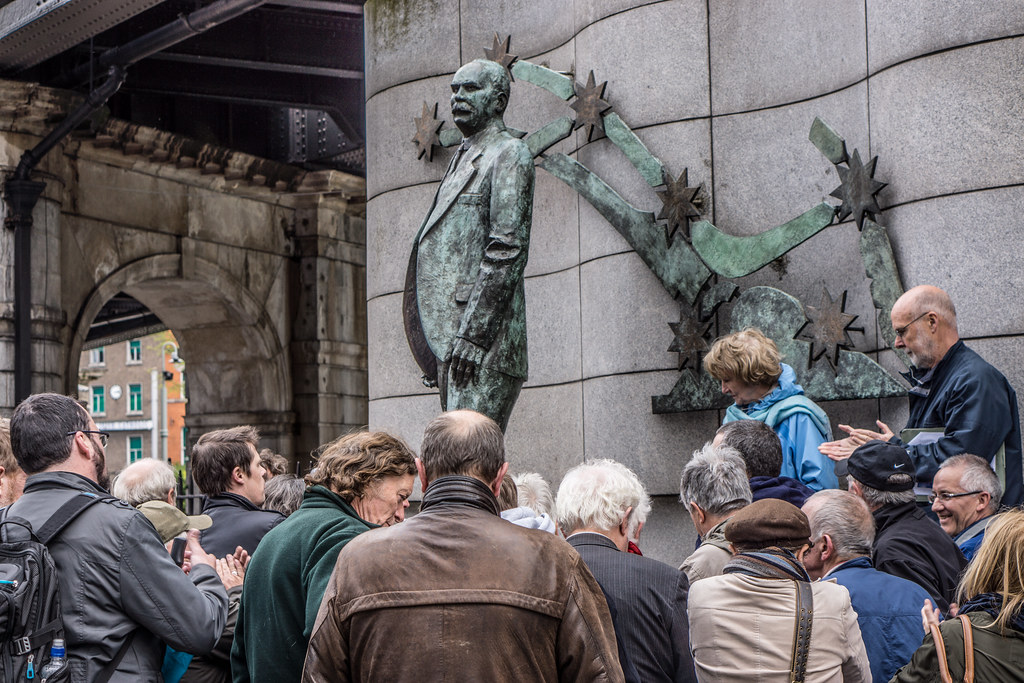JAMES CONNOLLY STATUE NEAR LIBERTY HALL
James Connolly 5 June 1868 – 12 May 1916) was an Irish republican and socialist leader, aligned to syndicalism and the Industrial Workers of the World. He was born in the Cowgate area of Edinburgh, Scotland, to Irish immigrant parents. He left school for working life at the age of 11, but became one of the leading Marxist theorists of his day. He also took a role in Scottish and American politics. He was executed by a British firing squad because of his leadership role in the Easter Rising of 1916.
Connolly's legacy in Ireland is mainly due to his contribution to the republican cause and while his legacy as a socialist has been claimed by a variety of left-wing and left-republican groups, he is primarily associated with the Labour Party which he founded.
Connolly was among the few European members of the Second International who opposed, outright, World War I. This put him at odds with most of the socialist leaders of Europe.
He was influenced by and heavily involved with the radical Industrial Workers of the World labour union, and envisaged socialism as Industrial Union control of production. Likewise, he envisaged independent Ireland as a socialist republic.
In Scotland, Connolly's thinking was hugely influential for socialists such as John Maclean, who would, like him, combine his leftist thinking with nationalist ideas when he formed the Scottish Workers Republican Party.
There is a statue [see photograph above] of James Connolly in Dublin, outside Liberty Hall, the offices of the SIPTU trade union. Another statue of Connolly stands in Union Park, Chicago near the offices of the Chicago branch of the IWW and UE. There is a bust of Connolly in Troy NY, in the park behind the statue of Uncle Sam.
In a 1972 interview on the Dick Cavett Show, John Lennon stated that James Connolly was an inspiration for his song, Woman Is the Nigger of the World. Lennon quoted Connolly's 'the female is the slave of the slave' in explaining the feminist inspiration for the song.
Connolly Station, one of the two main railway stations in Dublin, and Connolly Hospital, Blanchardstown, are named in his honour.
In a 2002, BBC television production, 100 Greatest Britons where the British public were asked to register their vote, Connolly was voted in 64th place.
Connolly's legacy in Ireland is mainly due to his contribution to the republican cause and while his legacy as a socialist has been claimed by a variety of left-wing and left-republican groups, he is primarily associated with the Labour Party which he founded.
Connolly was among the few European members of the Second International who opposed, outright, World War I. This put him at odds with most of the socialist leaders of Europe.
He was influenced by and heavily involved with the radical Industrial Workers of the World labour union, and envisaged socialism as Industrial Union control of production. Likewise, he envisaged independent Ireland as a socialist republic.
In Scotland, Connolly's thinking was hugely influential for socialists such as John Maclean, who would, like him, combine his leftist thinking with nationalist ideas when he formed the Scottish Workers Republican Party.
There is a statue [see photograph above] of James Connolly in Dublin, outside Liberty Hall, the offices of the SIPTU trade union. Another statue of Connolly stands in Union Park, Chicago near the offices of the Chicago branch of the IWW and UE. There is a bust of Connolly in Troy NY, in the park behind the statue of Uncle Sam.
In a 1972 interview on the Dick Cavett Show, John Lennon stated that James Connolly was an inspiration for his song, Woman Is the Nigger of the World. Lennon quoted Connolly's 'the female is the slave of the slave' in explaining the feminist inspiration for the song.
Connolly Station, one of the two main railway stations in Dublin, and Connolly Hospital, Blanchardstown, are named in his honour.
In a 2002, BBC television production, 100 Greatest Britons where the British public were asked to register their vote, Connolly was voted in 64th place.
You will find links to buy products from Amazon, Google and other partners. If you click on these links, you’ll find that the URL includes a small extra piece of text which identifies that the click came from my websites. This text is an affiliate code, and it means that I get a small percentage of the money you spend if you choose to buy that product, or, in some cases, other products from the site soon after. These affiliate links help pay the costs of producing my websites and ensure that the content is free to you.
COPYRIGHT INFORMATION BELOW APPLIES ONLY TO PHOTOGRAPHS

This work by William Murphy aka Infomatique is licensed under a Creative Commons Attribution-NonCommercial-ShareAlike 4.0 International License.
Permissions beyond the scope of this license may be available at https://excellentstreetimages.com/in-the-year-twentytwenty/copyright/.



